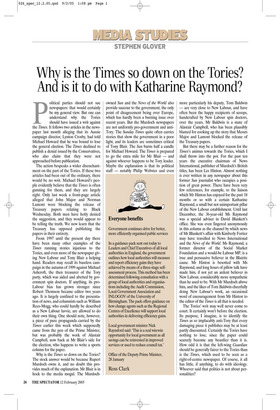Why is the Times so down on the Tories?
And is it to do with Katharine Raymond?
Political parties should not sue newspapers: that would certainly be my general view. But one can understand why the Tories should have issued a writ against the Times. It follows two articles in the newspaper last month alleging that its Aussie campaign director, Lynton Crosby, had told Michael Howard that he was bound to lose the general election. The Times declined to publish a denial issued by the Conservatives, who also claim that they were not approached before publication.
The action bespeaks a wider disenchantment on the part of the Tories. If these two articles had been out of the ordinary, there would be no writ. Michael Howard’s people evidently believe that the Times is often gunning for them, and they are largely right. Only last week a front-page article alleged that John Major and Norman Lamont were blocking the release of Treasury papers relating to Black Wednesday. Both men have hotly denied the suggestion, and they would appear to be telling the truth. We now learn that the Treasury has opposed publishing the papers in their entirety.
From 1997 until the present day there have been many other examples of the Times running stories injurious to the Tories, and even more of the newspaper giving New Labour and Tony Blair a helping hand. Readers may recall its baseless campaign in the autumn of 1999 against Michael Ashcroft, the then treasurer of the Tory party, which was aided and abetted by government spin doctors. If anything, its proLabour bias has grown stronger since Robert Thomson became editor two years ago. It is largely confined to the presentation of news, and columnists such as William Rees-Mogg, who could hardly be described as a New Labour luvvie, are allowed to do their own thing. One should note, however, a piece of pure propaganda carried by the Times earlier this week which supposedly came from the pen of the Prime Minister, but was probably the work of Alastair Campbell, now back at Mr Blair’s side for the election, who happens to write a sports column for the paper.
Why is the Times so down on the Tories? The stock answer would be because Rupert Murdoch owns it, and no doubt this provides much of the explanation. Mr Blair is in hock to the media mogul. The Murdoch owned Sun and the News of the World also provide succour to the government, the only point of disagreement being over Europe, which has hardly been a burning issue over recent years. But the Murdoch newspapers are not uniformly pro-government and antiTory. The Sunday Times quite often carries stories that show the government in a poor light, and its leaders are sometimes critical of Tony Blair. The Sun burns half a candle for Michael Howard. The Times is prepared to go the extra mile for Mr Blair — and against whoever happens to be Tory leader. Maybe the explanation is that its political staff — notably Philip Webster and even more particularly his deputy, Tom Baldwin — are very close to New Labour, and have often been the happy recipients of scoops, handcrafted by New Labour spin doctors, over the years. Mr Baldwin is a mate of Alastair Campbell, who has been plausibly blamed for cooking up the story that Messrs Major and Lamont blocked the release of the Treasury papers.
But there may be a further reason for the Times’s animus towards the Tories, which I shall throw into the pot. For the past ten years the executive chairman of News International, publisher of Murdoch’s British titles, has been Les Hinton. Almost nothing is ever written in any newspaper about this former Sun journalist who occupies a position of great power. There have been very few references, for example, to the liaison which Mr Hinton has enjoyed for the past 18 months or so with a certain Katharine Raymond, a small but not unimportant pillar of the New Labour establishment. Until last December, the 36-year-old Ms Raymond was a special adviser in David Blunkett’s office. She was even fingered anonymously in this column as the channel by which news of Mr Blunkett’s affair with Kimberly Fortier may have travelled to News International and the News of the World. Ms Raymond, a former director of the Social Market Foundation and a would-be Labour MP, is a true and persuasive believer in the Blairite cause. Mr Hinton is besotted with Ms Raymond, and long hours of pillow talk have made him, if not yet an ardent believer in New Labour, considerably more sympathetic than he used to be. With Mr Murdoch above him, and the likes of Tom Baldwin cheerfully doing New Labour’s work, an occasional word of encouragement from Mr Hinton to the editor of the Times is all that is needed.
The Tories’ writ may well never come to court. It certainly won’t before the election. Its purpose, I imagine, is to identify the Times as so implacably anti-Tory that every damaging piece it publishes may be at least partly discounted. Certainly the Tories have nothing to lose, since the paper could scarcely become any beastlier than it is. How odd it is that the left-wing Guardian should be generally fairer to the Tories than is the Times, which used to be seen as a right-of-centre newspaper. Of course, it all has little, if anything, to do with ideology. Whoever said that politics is not about personalities?













































 Previous page
Previous page